Jack Smith filed a motion in limine Wednesday morning. As we’ve discussed previously, this is a type of motion used to obtain a pre-trial ruling from the judge regarding the admissibility of certain types of evidence at trial.
Decisions about the admissibility of evidence are within the trial judge’s discretion. They are only reversible error (the kind that can invalidate a conviction) if the court of appeals believes the judge abused their discretion when they admitted a piece of evidence. This means prosecutors must be careful. On the one hand, they must ensure they can put in all of the evidence that is essential to prove their case. But they must also take care that they don’t push the envelope too far when it comes to either admitting their evidence or efforts to exclude evidence a defendant wants to offer.
Given that context, prosecutors, and courts too, are usually fairly permissive when it comes to evidence a defendant wants to offer. But there’s a clear line. Defendants can’t offer evidence that is designed to suggest to the jury, “even if you think I’m guilty, you should vote to acquit me anyway.” This is called jury nullification, and it’s an effort by a defendant to convince jurors to ignore the law and refuse to convict.
That seems to be a key part of Donald Trump’s strategy, and Jack Smith calls it out in his motion, asking the court to prevent Trump from offering evidence that isn’t relevant to the charges against him, but that is designed to sway the jury to acquit for impermissible reasons.
We’ll walk through the motion, but just a flag here: the D.C. prosecution is currently stayed by order of the court. Smith takes the position, which he did in an earlier filing after the stay, that it’s permissible for him to file additional material consistent with previously set court deadlines during the stay.
Trump’s lawyers are certain to call that out, and we could see a ruling from the court prohibiting additional filings during the stay. Smith’s position is that he can still file to “provide the court and defendant notice” as well as to “promote the prompt resumption of the pretrial schedule” if Trump loses his appeal. It’s likely Judge Chutkan will weigh in at some point on whether Smith’s assessment of this is correct.
But, back to the issue at hand: admissibility of evidence. Only relevant evidence is admissible at trial. Federal Rule of Evidence 401 provides that evidence is relevant if it tends to make a fact that is important to deciding an issue in the case more or less likely to be true. Smith argues that Trump has made it clear he intends to introduce evidence and arguments that have no bearing on his guilt or innocence. He argues any evidence of that type is inadmissible because it’s not relevant and could also unduly prejudice the jury.
Smith has three buckets of evidence he wants to prevent Trump from offering:
Evidence and arguments that don’t bear on guilt or innocence
Irrelevant and prejudicial evidence and argument about January 6
“Other” improper evidence
Each bucket is full of specific examples of evidence Smith wants the court to prohibit Trump from raising in front of the jury. His arguments are well grounded in the law, and when Judge Chutkan rules on the motion, it’s likely she will sign off on substantially all of his requests, although she may offer Trump some leeway to protect the record on appeal. One additional option: judges will sometimes admonish the parties to approach the bench before they raise an issue that has been the subject of a motion in limine out of the hearing of the jury, so the judge can assess the evidence’s relevance in context at that time before making a final ruling on admissibility of a specific piece of evidence. In some cases, she may conditionally rule the evidence is inadmissible but give Trump’s lawyers the opportunity to ask her to reconsider, given developments are trial.
The full motion runs to 20 pages. Here are some of key the arguments Smith makes:
Evidence and arguments that don’t bear on guilt or innocence
Smith asks the court to prevent Trump from repeating “unsupported and politicized claims of selective and vindictive prosecution … irrelevant issues related to the government’s investigation” and complaints that the indictment and trial interfere with his campaign. It’s the kind of argument we can expect to see the court grant, at least once the stay is lifted. Once these legal issues are decided by the court pursuant to Trump’s motions to dismiss, they cannot be reconsidered by the jury and the jury cannot overrule the judge’s decision. Decisions on legal matters are the provenance of the judge. Factual matters are left up to the jury for a decision. Smith explains:
Note Smith’s ask here: he wants the judge to prohibit Trump’s lawyers from explicitly re-arguing legal defenses like selective prosecution and also from hinting at them through the use of provocative language like “Injustice Department” or “Biden Indictment” in front of the jury. Smith argues that while this is permissible political rhetoric in the public square, Trump can’t use it in front of a jury because it’s sole purpose would be to get the jury to nullify and acquit him, rather than deliver a verdict based on the evidence.
Also, arguments about selective prosecution or impropriety in the investigation have no bearing on Trump’s guilt or innocence. They can be raised before the judge as legal issues that may merit sanctions against the government or even dismissal of charges, which is what Trump asks for. But once denied by a judge, they have no bearing on guilt or innocence and no relevance to a jury’s decision. Similarly, Trump’s motions arguing immunity and that his speech should be protected by the First Amendment offer pure legal defenses that, if denied by the judge, cannot be raised again in front of the jury. Again, Smith’s request is due to be granted.
Smith also asks the court to prohibit Trump from raising anything that touches on the consequences of a conviction, which is standard. Defendants cannot raise issues of punishment, for instance, to plant the idea in jurors’ minds that they should acquit because of a potential lengthy sentence or other consequences of conviction. Smith’s argument is in the heartland of the types of evidence judges routinely exclude as a proper exercise of their discretion.
Irrelevant and prejudicial evidence and argument about January 6
Smith explains his objection to what he believes Trump’s strategy will be like this:
Smith argues that just like a bank robber can’t blame the robbery on failed efforts by bank security guards, Trump can’t try to excuse his conduct, claiming Capitol Police and others should have prevented the insurrection. Similarly, Smith wants the court to prohibit the introduction of baseless evidence that would try to blame January 6 on government agents or foreign actors, theories Trump and his supporters have advanced absent any evidentiary support. Even if true, they would not be relevant as to Trump’s guilt. Smith also objects to the introduction of evidence about any new laws passed after January 6 to expand the tools available to prosecutors. They too are irrelevant because Trump is charged only with violating laws that were in existence at the time he committed his alleged crimes.
“Other” improper evidence
Smith focuses on two items here: Trump’s state of mind, which is an essential element to proving the charges against him, and preventing improper cross-examination of witnesses.
As to state of mind, Smith acknowledges that both sides can introduce circumstantial evidence of Trump’s state of mind at trial, and that Trump might even (probably over his lawyers’ dead bodies) choose to testify about it himself. What Smith objects to is witnesses Trump might offer who would go beyond what they actually observed to speculate about Trump’s “state of mind or beliefs about the election or his claims of election fraud.”
Witnesses aren’t permitted to testify to personal conclusions about what someone was thinking. That is an ultimate issue that is left up to the jury to decide. A witness can testify that he saw a defendant gather maps of a bank, prepare a disguise, and borrow a car to get there. But the witness can’t testify to what a defendant intended to do—to what was going on inside of the defendant’s head. There’s a fine line legal distinction here. Witnesses can’t invade the jury’s role in deciding what Trump’s state of mind was, based on circumstantial evidence that could include things like what he said and did following the election.
Smith is on sound legal footing when he argues that permitting a witness to speculate about ultimate conclusions—that Trump honestly believed there was fraud, for instance, is inappropriate because it’s up to the jury to reach that conclusion based on the evidence they hear, and having one of Trump’s witness testify about what they believed “would be speculative, unhelpful to the jury, and unfairly prejudicial, and should thus be excluded.” If Trump wants a witness to testify to what was going on in his mind there is only one witness who should be permitted to do that—him. In other words, witnesses can testify to what they observed, but it’s up to the jury to reach a conclusion about what it means.
Smith also wants to prevent Trump’s lawyers from cross-examining witnesses in a manner that makes them appear deceitful or as though they are deliberately withholding information when the existence of a privilege prevents them from answering a question. He references a potential problem on cross-examination, which makes it clear that his concern is with witnesses who will testify for the government and then be subject to questioning by Trump’s lawyers.
The problem Smith anticipates is that some of his witnesses have “knowledge of information protected by certain privileges, including the attorney-client privilege and the Speech or Debate privilege,” and could decline to answer and assert privilege if questioned about it. Smith explains his concern that jurors could conclude the witnesses are hiding something when they are simply trying to navigate the legal constraints these privileges could place on them:
This is a fascinating window into the testimony Smith intends to offer, but it’s not well illuminated. We don’t know who the witnesses are, what their testimony for the government involves, or what the privileged matters within their ken are. Smith specifies that some of them may have Speech or Debate privilege protections, which suggests members of Congress, their personal or office staff, or people who received communications from them. Speech or Debate clause protection extends beyond proceedings on the floor and covers, for instance, investigative committee work. And attorney client privilege suggests a range of possibilities, including lawyers.
By filing the motion, Smith puts Trump’s lawyers in something of a box when they are required to respond, which likely won’t be until the immunity appeal is resolved and the case is (hopefully) back before Judge Chutkan. Either they will have to disavow their intent to offer the types of evidence Smith objects to, or confirm that they intend to offer it and explain why it’s permissible. And if they do the latter, they are unlikely to win, at least much, of their argument while losing credibility with the court for making it. In an ordinary case, prosecutors wouldn’t have to file a motion like this one because the defense wouldn’t be trying to relitigate purely legal issues in front of the jury or claiming some foreign phantom was responsible for the crime. Motions in limine are common, but they usually raise close issues of admissibility where the parties need the judge to make the call. Trump’s lawyers will be forced to decide between caving in to the demands of their audience of one—who will likely insist on fighting to the death for the ability to present clearly inadmissible material—or acting like professionals.
You can read the full motion here.
I pondered all day why Jack Smith would take the fairly provocative step of filing this motion while the stay is in place instead of waiting until the appeal is over and the trial court’s ability to proceed is restored. Trump is likely to respond harshly, accusing Smith of improper conduct. There is some merit to such a response. Smith may even draw a rebuke from the judge. Had I been making the call on this one, I believe I would have told my lawyers they couldn’t file during the stay. Maybe Smith just sees it differently. Or perhaps he has strong reasons for abandoning the restraint with which prosecutors usually behave and getting information in the motion out into the public domain. Prosecutors are only able to speak in court and through their pleadings. Stay tuned.
We’re in this together,
Joyce




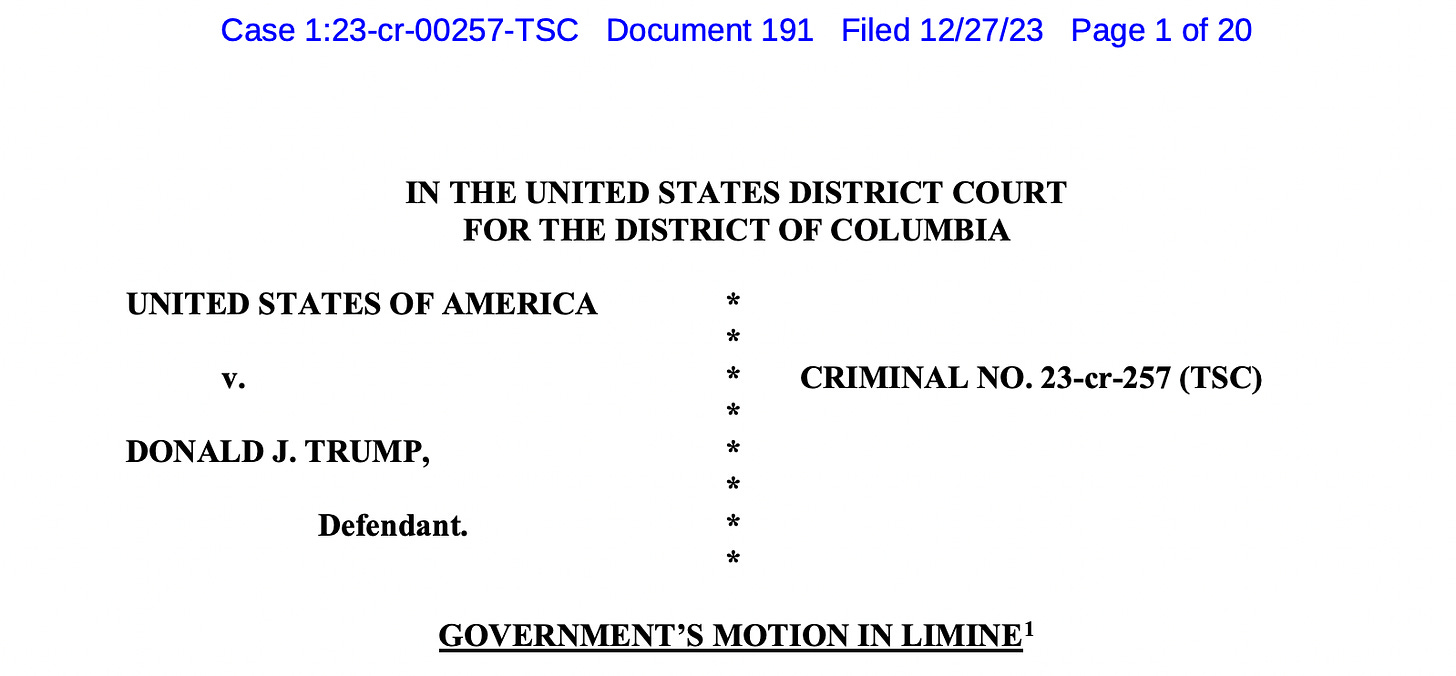
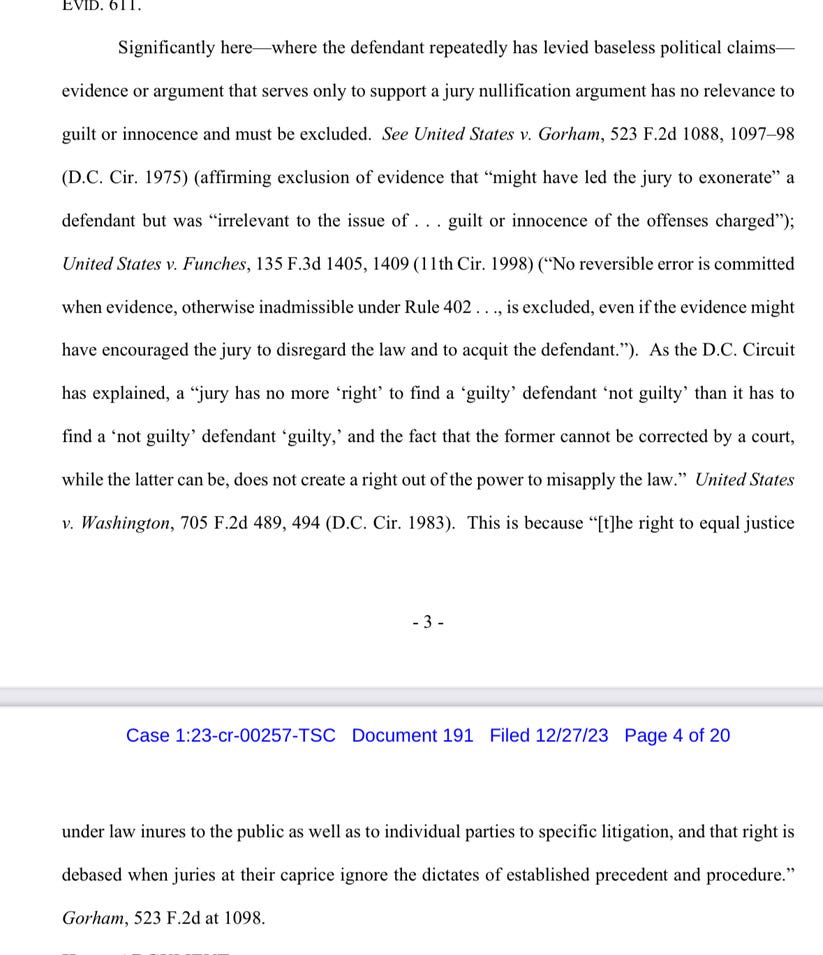


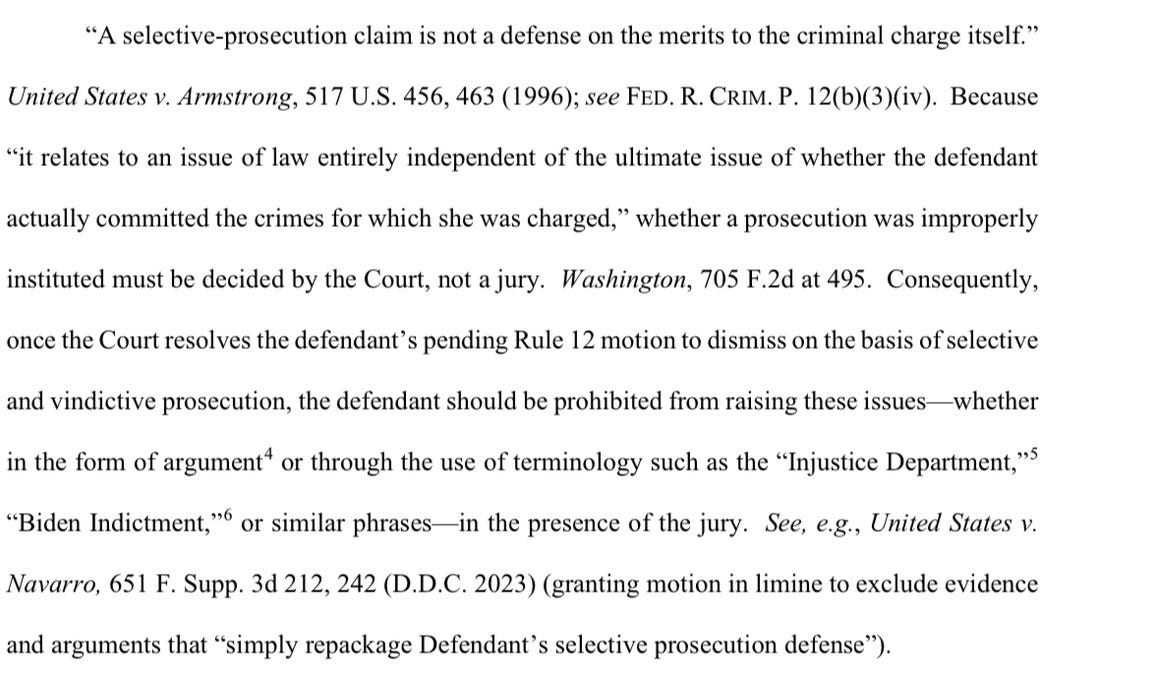
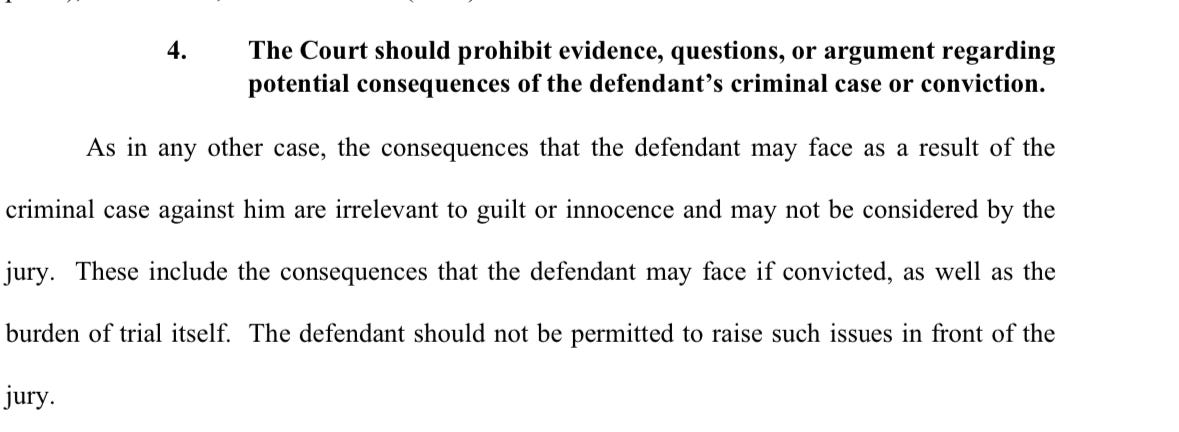
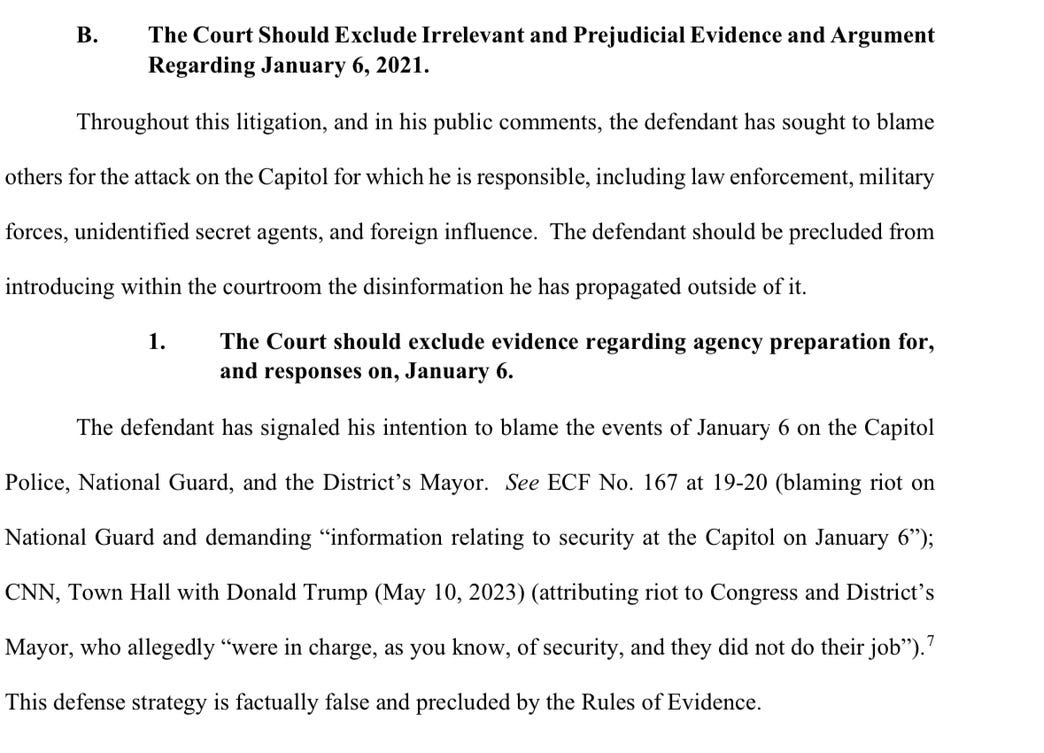
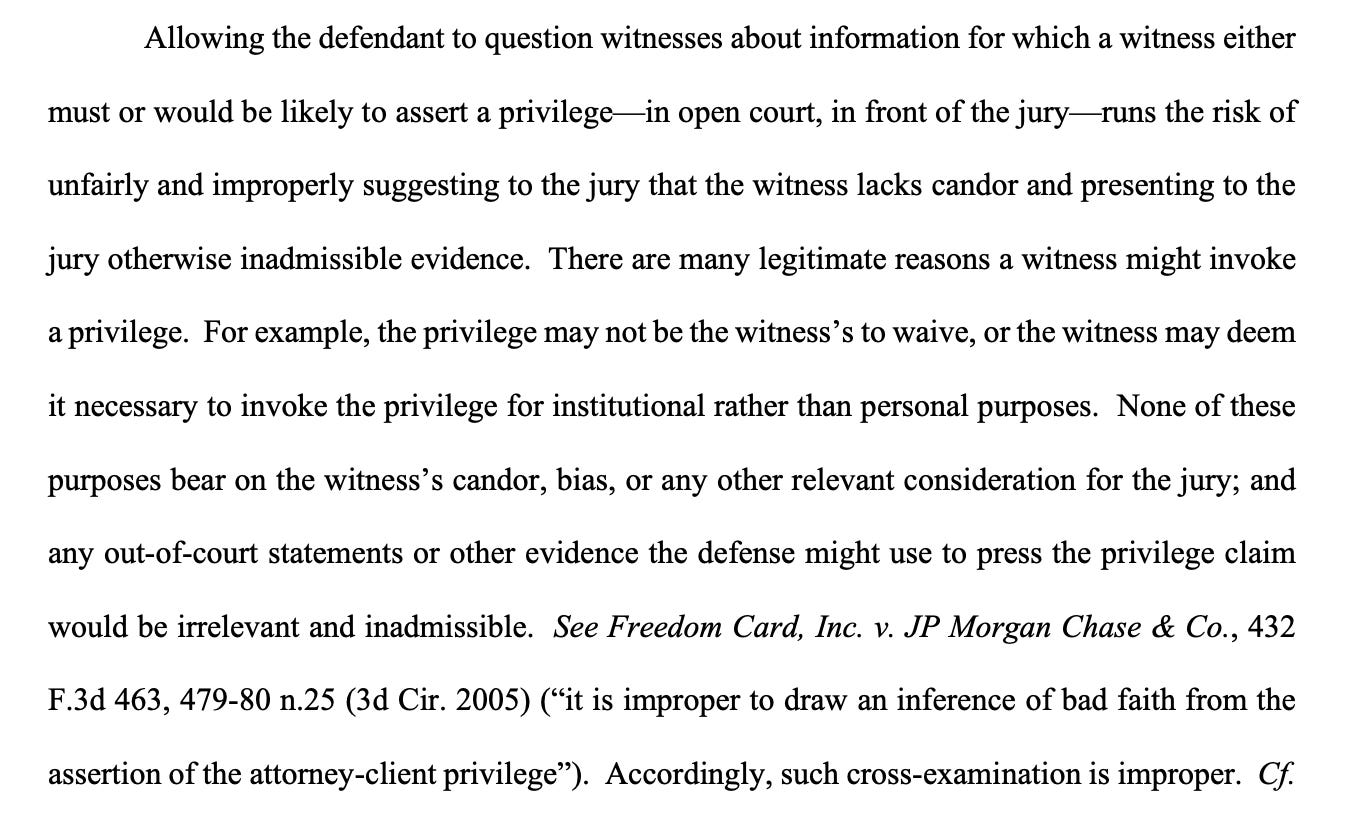
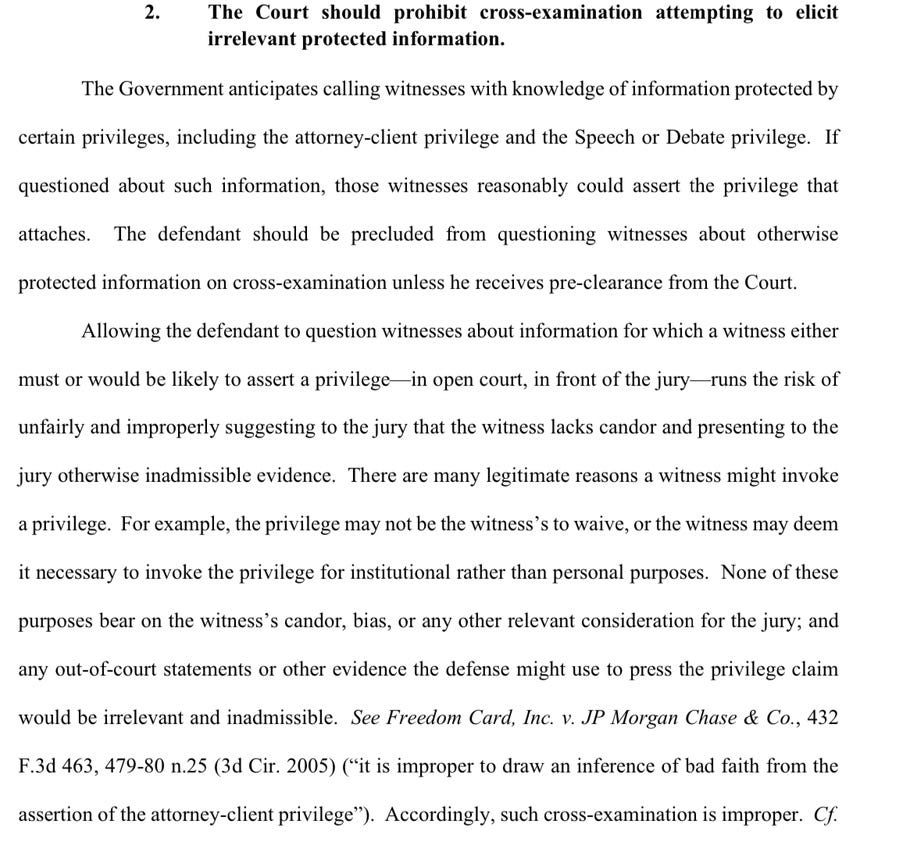
After reading the snippy brief opposing the petition for writ of certiorari and watching Ms. Habba auditioning for either Field Marshall of the White House Counsel in a 2nd Trump term, or his new campaign manager for 2024, I think Jack Smith is going for ALL the leeway he can get away with. As he should. The case is "The United States of America vs Donald J Trump." That "United States of America" part is US, and I want Jack Smith to bring that man to justice. I want to see him tried, convicted, and sentenced for what he tried to do. If nothing happens to Trump because he has his carnival barker lawyers throwing every argument AND the kitchen sink at this case, as is detailed in this motion, there isn't a two-tiered justice system, there is NO justice system. Jack Smith seems to be the only one left who is EFFECTIVELY fighting against this garbage, and so far, winning where it counts. I'm behind Jack Smith 100%.
Joyce, you are the BEST! You are a born “teacher” and all of us appreciate the time you spend to include us in understanding the information. Bravo! You make us smarter! Thank you!